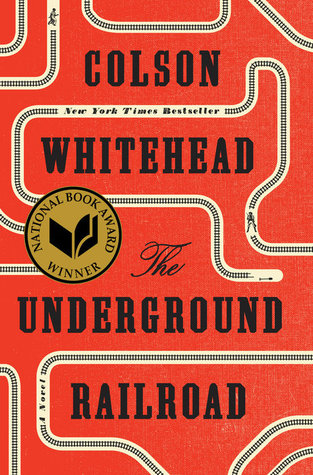Then, Whitehead and this book were featured in the book review section of the New York Times. I can't possibly ignore this now, can I? This book is chasing me everywhere. I put myself in line for it at the library. And then, there it was on NPR. Alright! I'm getting it!
The actual underground railroad was a series of secret routes and safe houses.
In Whitehead's world, the railroad is literally underground and comes complete with station agents who help the escaped slaves continue on to a new life.
I don't want to make this book sound cute. It's not. It's brutal and painful to read. It may be fiction but it's based in history and what slaves endured is horrifying at best. The book follows Cora, a slave on the Randall plantation. Her grandmother, Ajarry, was kidnapped from Africa and brought over to work to the cotton fields. Ajarry had Mabel who had Cora. The chapters are broken up in a way that we learn about Ajarry, Mabel, Ridgeway (a slave catcher), Caesar (Cora's runaway companion), Ethel, etc. interspersed with chapters about the various states Cora ends up in.
Mabel is the only slave to have successfully escaped the Randall plantation. She left Cora behind and that has been burning inside Cora ever since she became a stray. When the somewhat decent but still bad Randall brother died, the absolutely horrible and tyrannical brother took over his plantation. This prompted Cora and Caesar to run away to freedom. Lovey, Cora's friend, realizing what they were doing, took after them to find freedom herself. After a skirmish with night hunters, Cora kills a young white boy who was trying to capture her. Caesar and Cora get away, Lovey does not. We find out Lovey's fate later in the book.
Once Caesar and Cora find the first tunnel to the railway station, they are on their way to South Carolina. From here, the book follows Cora as she assumes a new identity, works for wages and tries to make a life. Ridgeway, the slave catcher who failed to catch Mabel, is not letting Cora get away.
Being that this is fiction, I am very curious if the chapter about North Carolina is true. While all of the book is difficult to read, the North Carolina chapter was particularly horrific. I've never been able to wrap my mind around how people could be considered property and how humans could treat other humans so badly. Yet there it is, in our history, repeated over and over and over again continuing on to present day.
I've said a few times that this book is hard to read. It is but it's worth the read. Our history is painful and it should never be shoved under the rug because we don't want to acknowledge how horrible our ancestors acted towards other human beings. Whitehead hit this one out of the park. Thank you for writing this, Mr. Whitehead!

No comments:
Post a Comment